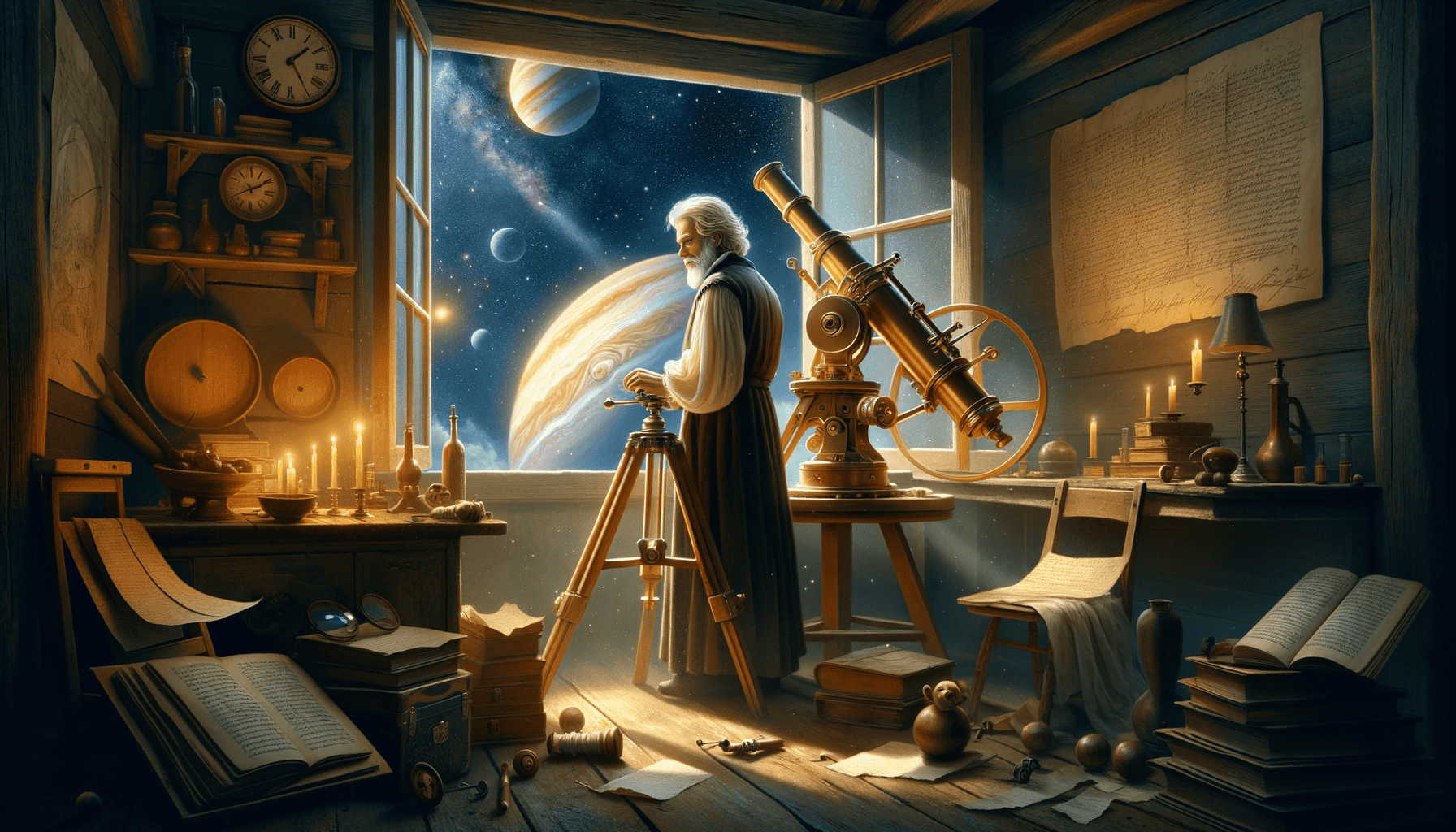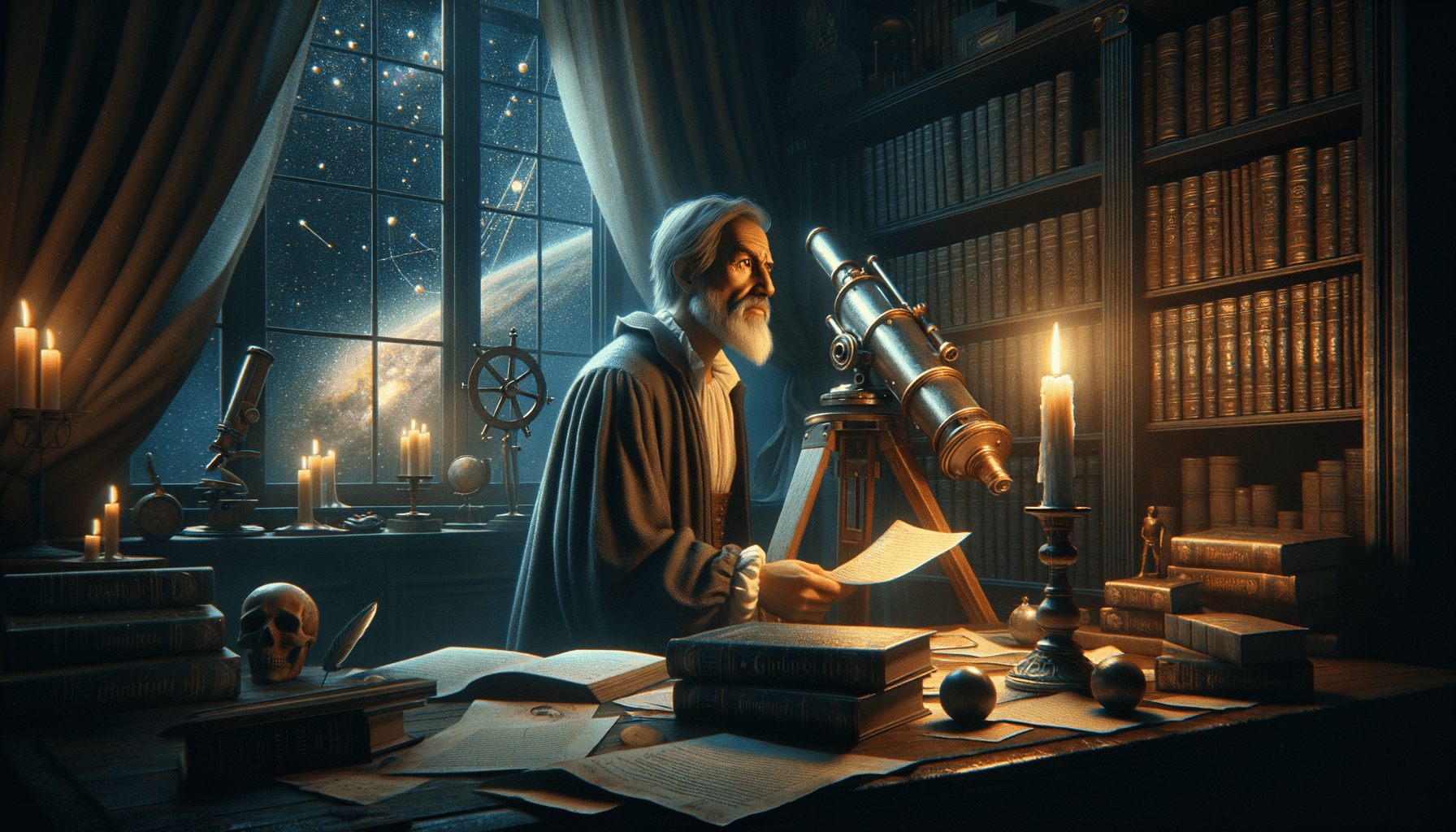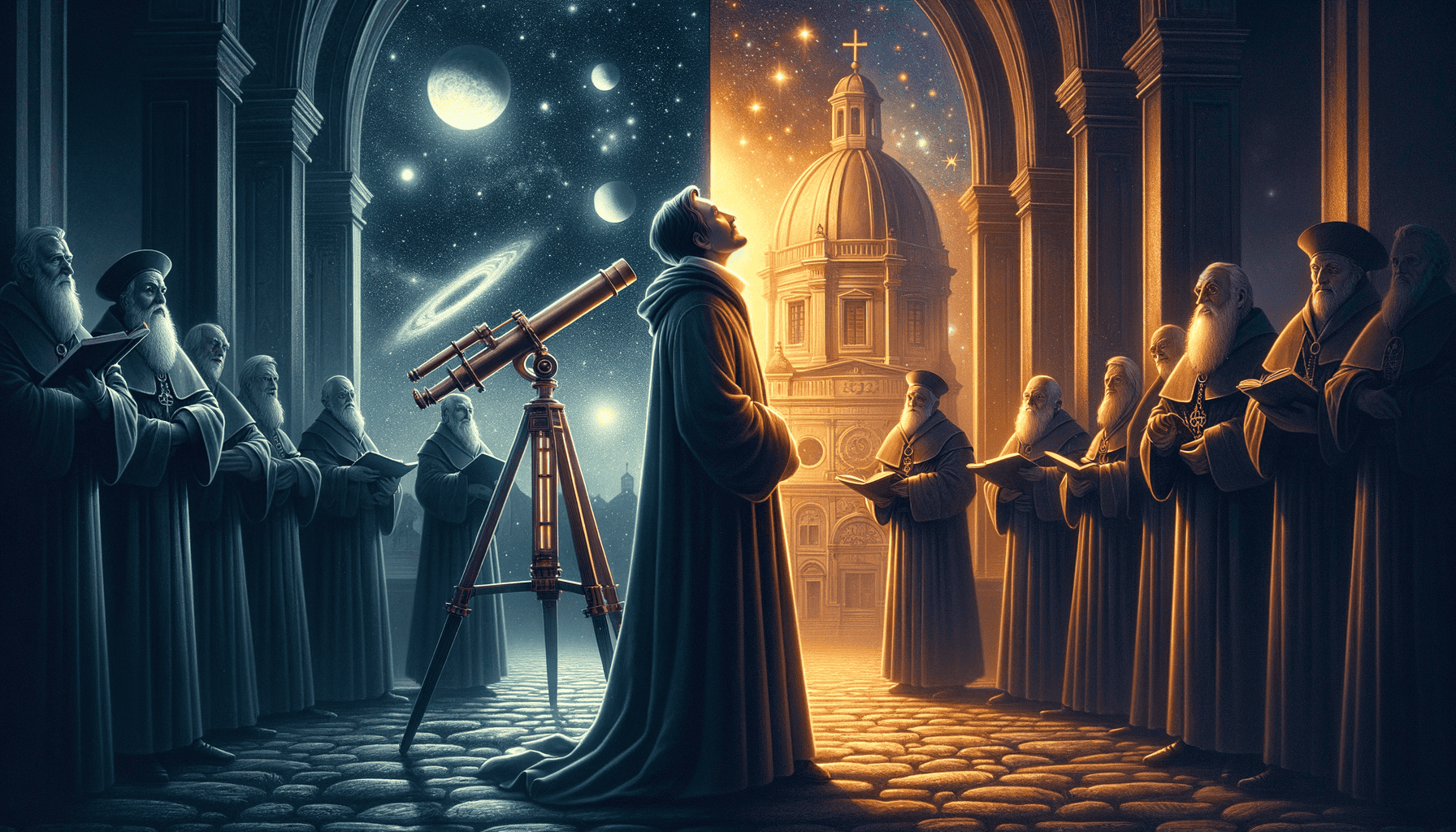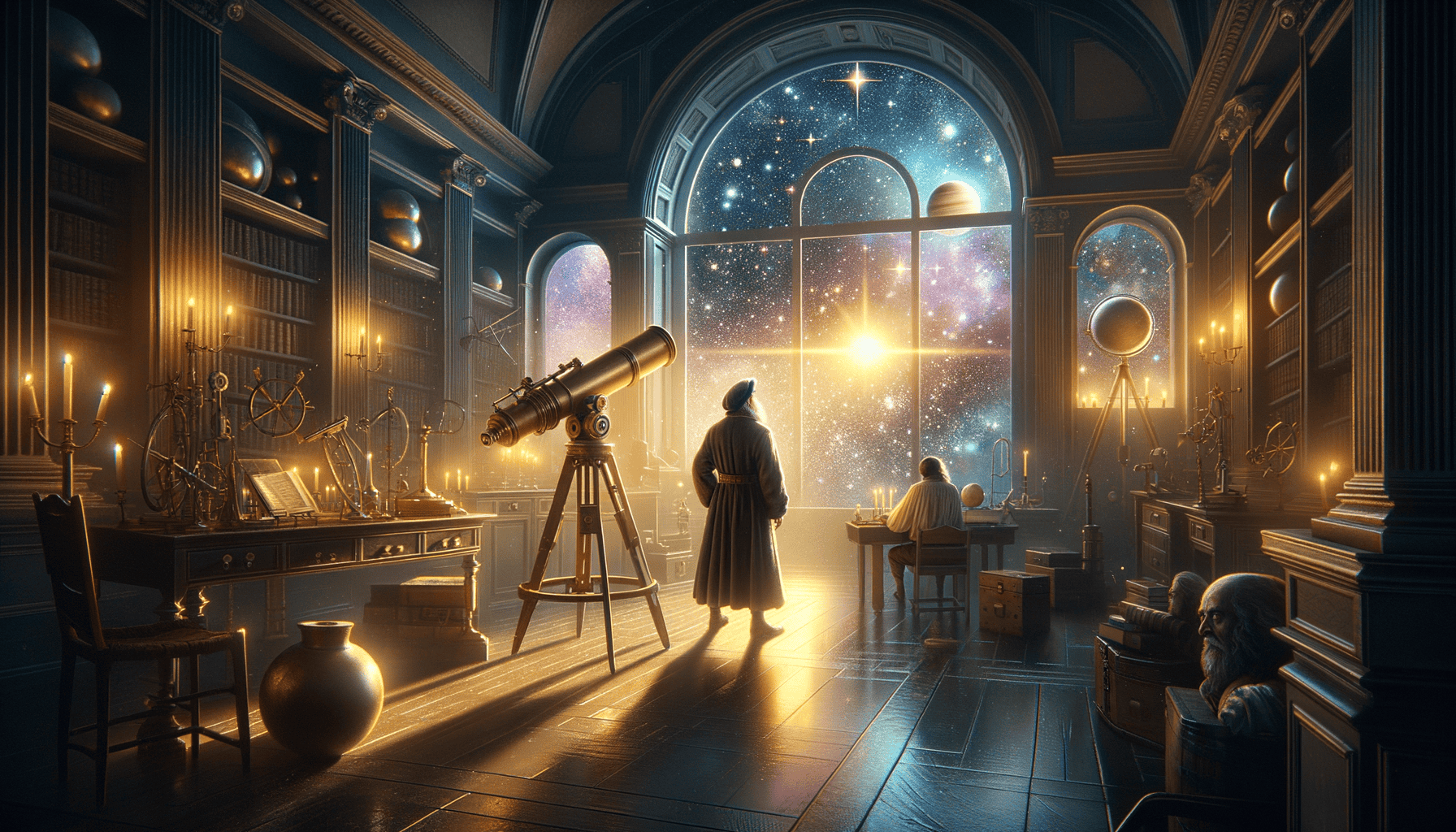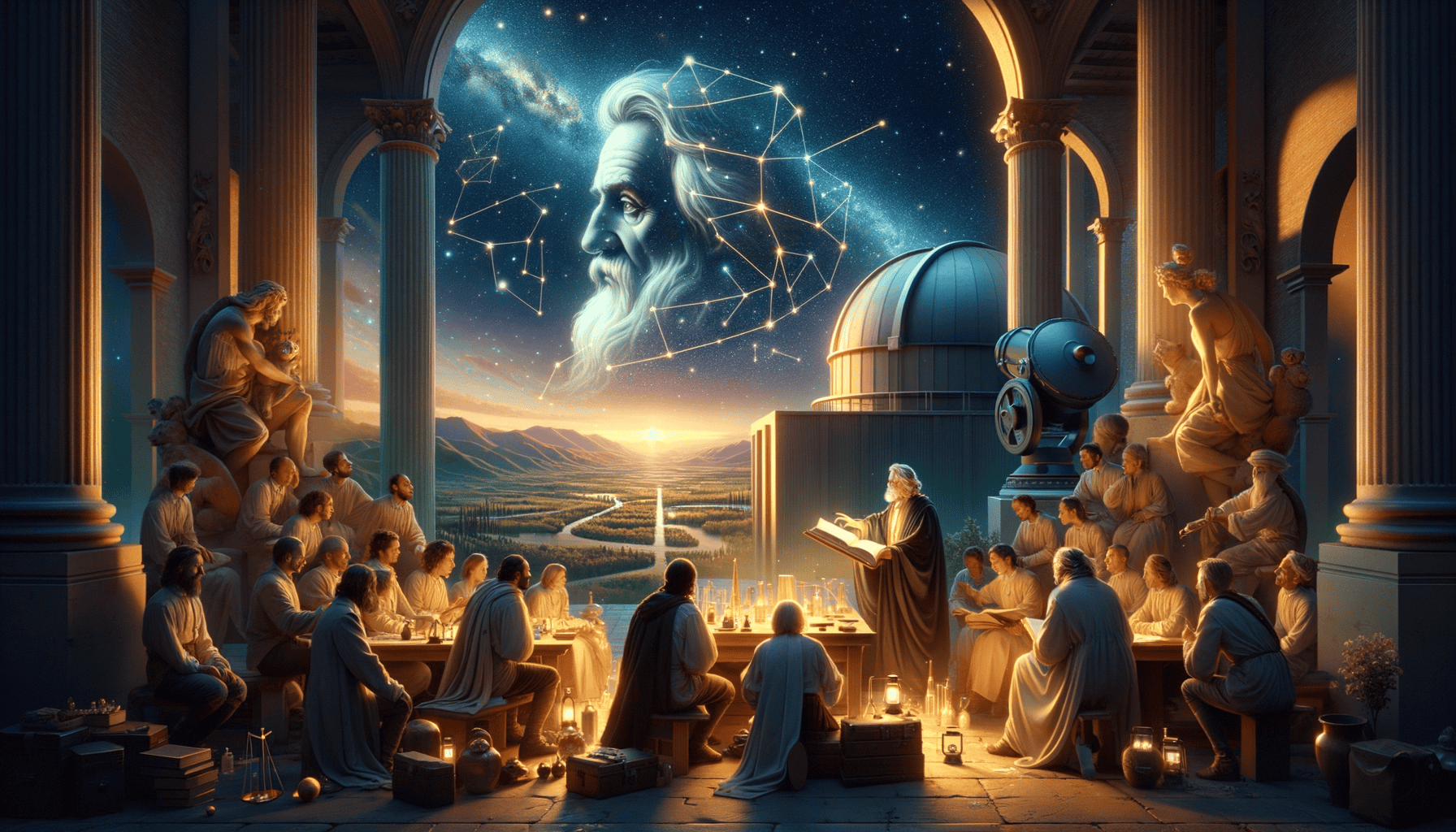The Curious Boy
The warm Italian sun peeked through the windows of a small house in Pisa. Inside, a young boy named Galileo sat at his wooden desk, his eyes wide with wonder. 🌟
“Mama, look what I made!” Little Galileo held up a toy windmill he had crafted from scraps of wood and paper.
His mother smiled warmly. “What does it do, my curious one?”
Galileo jumped up excitedly. “When the wind blows, the wings spin! Just like the big windmills outside the city!” He demonstrated by blowing on his creation, making it twirl.
Every day, Galileo found new things to explore. He watched birds soar through the sky and wondered why they could fly. He looked at flowers and counted their petals. Numbers were his special friends – he saw them everywhere! 🔢
A Special Gift
One morning, Galileo’s father, Vincenzo, came home with a special present.
“Son,” he said, pulling something from his bag, “this is an abacus. It helps us count and solve problems.”
Galileo’s eyes sparkled as he touched the wooden beads. He spent hours moving them back and forth, learning to add and subtract.
But not everyone understood Galileo’s curiosity. Some of his teachers wanted him to just learn from old books. But Galileo had questions – so many questions! 🤔
“Why does a ball roll down a hill?” he would ask.
“Because that’s what balls do,” his teachers would say.
But this answer wasn’t enough for Galileo. He wanted to know why things happened.
The First Discovery
One day in church, young Galileo noticed something interesting. A large lamp hanging from the ceiling was swinging back and forth. He watched it for a long time, counting under his breath.
“One, two, three… one, two, three…”
He realized something amazing – the lamp took the same time to swing whether it went far or just a little bit! This was his first real discovery. 🕰️
At home that night, Galileo told his father about the swinging lamp.
“Papa, I watched it for hours! It’s like it’s keeping time, like your music!”
Vincenzo, who was a musician, understood his son’s excitement. “Sometimes, my boy, the best music is in the numbers we find in nature.”
Dreams of Stars
At night, Galileo would sit by his window and look at the stars. ⭐
“What are they?” he wondered. “Why do they move across the sky?”
His mother would often find him asleep by the window, star charts and drawings scattered around him.
She would gently wake him, saying, “My little scientist, even curious minds need rest.”
Making Things Better
Young Galileo wasn’t just interested in watching things – he wanted to make them better. When he saw workers using tools, he thought of ways to improve them.
He drew pictures of his ideas in a small notebook his father had given him. Some people laughed at his strange drawings, but Galileo didn’t mind. He knew that asking questions was the best way to learn.
As the years passed, Galileo’s curiosity only grew stronger. Each day brought new wonders to explore and new puzzles to solve. His mind was like a garden where ideas grew wild and free, reaching toward the sun of discovery. 🌱
Little did anyone know that this curious boy from Pisa would one day change how we see the whole world – and beyond. His questions about the swinging lamp, the rolling balls, and the twinkling stars were just the beginning of an amazing journey.
The Telescope of Discovery
The streets of Venice buzzed with excitement. Galileo, now a grown man, hurried through the crowded marketplace. In his hands, he carried something special – a long tube with glass pieces at both ends. 🔭
“Come see!” he called out. “Look at what I made!”
A Better Way to See
People gathered around as Galileo set up his telescope. “This helps us see things that are far away,” he explained. “Watch this!”
He pointed the telescope at a church bell tower in the distance. People took turns looking through it.
“I can read the numbers on the clock!” one person gasped. “But it’s so far away!”
Galileo smiled. His improved telescope could make things appear eight times closer than they really were. 🏰
Looking to the Stars
That night, Galileo did something no one had done before. He pointed his telescope at the sky.
“The moon… it’s not smooth at all! It has mountains and valleys, just like Earth!”
He drew pictures of what he saw. The moon wasn’t perfect and smooth like everyone thought. It had rough spots and bright spots. This was big news! 🌕
Jupiter’s Dancing Stars
On a cold January night, Galileo saw something even more amazing. Near Jupiter, he spotted four tiny dots of light.
“What are those?” he wondered.
Night after night, he watched these dots. They moved around Jupiter like dancers in a circle. They were moons – just like Earth’s moon! 🪐
Not Everyone Was Happy
Some people didn’t like what Galileo was saying. They believed that everything in space moved around Earth.
“But look through the telescope!” Galileo would say. “See for yourself!”
Many refused to look. “The old books say differently,” they argued. “Your telescope must be wrong.” 😤
Writing it Down
Galileo knew what he saw was real. He wrote a book called “The Starry Messenger.” In it, he drew pictures of the moon’s surface and Jupiter’s moons.
The book made him famous! Kings and queens wanted to meet him. Students came from far away to learn from him.
More Discoveries
Galileo kept looking at the sky. He found dark spots on the sun (using special paper to protect his eyes). He saw that Venus changed shape, just like the moon does. ☀️
Each discovery showed that the universe was more amazing than anyone had thought. But they also got Galileo into more trouble.
“The Earth moves around the sun,” he said. This idea made many powerful people angry.
But Galileo wouldn’t stop looking up. His telescope showed him wonders no one had ever seen before. Every night brought new discoveries, new questions, and new chances to learn about our place among the stars. ⭐
As he wrote in his notebook one night: “I have seen things that make all the old stories about the heavens seem like children’s tales. The truth is up there, written in the stars, waiting for anyone brave enough to look up and see.”
Changing Times
The warm Tuscan sun streamed through Galileo’s study window. He squinted as he tried to read his notes. Something wasn’t right with his eyes. The words seemed blurry, like looking through foggy glass. 👀
“Maria!” he called to his daughter. “Can you help me read this?”
New Books, New Troubles
Despite his failing eyes, Galileo wrote more than ever. He finished a big book about sunspots. In it, he wrote about how the sun had dark spots that moved across its surface.
“But Father,” Maria said, “won’t this make some people angry?”
“The truth is the truth, my dear,” Galileo replied. “Even if some don’t want to see it.” 📚
Letters from Rome
One morning, a letter arrived with a red seal. It was from the Catholic Church in Rome.
“Your ideas about the Earth moving around the sun are dangerous. You must stop teaching them.”
Galileo’s hands shook as he read the letter. His eyes hurt more than usual that day. 📜
Fighting Back with Words
Instead of giving up, Galileo wrote more. He wrote letters to his friends. He wrote books explaining his ideas in simple ways.
“Look through my telescope,” he would say. “See the truth with your own eyes!”
Hard Days
Reading became harder each day. Writing was difficult too. But Galileo didn’t stop.
“Maria, please write this down,” he would say. Then he would tell her what he saw in the sky.
His daughter became his eyes. She helped him work even when things got tough. 👧
Strange New Problems
One night, while looking at the stars, Galileo noticed something scary. The bright stars had halos around them, like little rainbows.
“That’s not right,” he whispered. His eyes were getting worse.
Standing Strong
More angry letters came from Rome. More people said his ideas were wrong. But Galileo kept working.
“I might not see as well as before,” he told Maria, “but I can still think. I can still teach. I can still learn.”
He wrote a new book about how things move. He wrote about falling objects and rolling balls. Even with bad eyes, his mind was sharp. 🧠
Changes Coming
The air felt heavy with worry. Galileo knew bigger troubles were coming. His eyes were getting worse, and his enemies were getting angrier.
But each morning, he got up and went to work. He had Maria read to him. He had her write down his thoughts.
“We must keep going,” he would say. “The truth doesn’t go away just because some people close their eyes to it.” ⭐
As the sun set outside his window, Galileo touched the telescope that had shown him so many wonders. His sight might be failing, but his vision of the truth was clearer than ever.
A Time of Trial
The room was dark and cold. Galileo stood before the Church leaders in Rome. His eyes strained to see their faces in the dim light. 🏛️
Speaking Truth
“Show us your proof,” the Church leaders said.
Galileo’s voice was strong and clear. “I have seen it through my telescope. The planets move. The Earth moves too.”
“But the Bible says the Earth stands still,” they answered. 📖
A Hard Choice
The leaders gave Galileo two choices:
“Say you were wrong, or face big trouble.”
Galileo thought about Maria and his work. His eyes hurt from the dark room and stress. 😔
Brave Words
“I’m just trying to understand God’s world better,” Galileo said. “The stars and planets show us how things really work.”
But the leaders shook their heads. They didn’t want to hear it.
A Sad Decision
Galileo’s heart felt heavy. He thought about his books, his students, and his daughter waiting at home.
“I… I take back what I said,” he whispered. “The Earth does not move.”
But in his heart, he knew the truth. 💭
Going Home
The leaders let him go home, but with rules:
• He couldn’t teach about the Earth moving
• He couldn’t write new books about it
• He had to stay in his house
“At least I can still think,” Galileo told himself. “At least I can still wonder.” 🏠
Finding Hope
Back home, Maria hugged him tight. “Are you okay, Father?”
“Yes, my dear. They can tell me what to say, but they can’t tell me what to think.”
New Ways to Work
Galileo couldn’t go out much anymore. His eyes got worse too. But he found new ways to work.
He had friends visit to talk about science. He asked Maria to write letters for him. He thought about new ideas while sitting in his garden. 🌳
Still Teaching
“Tell me what you see in the sky,” he would ask visitors.
They would describe the stars and planets. Galileo would explain what it all meant.
Even when he couldn’t see well, he helped others understand the sky better. 🌟
Looking Forward
Galileo touched his old telescope. It had shown him so many wonderful things.
“The truth is like the sun,” he told Maria. “You can hide it for a while, but it always comes out again.”
His eyes might be getting darker, but his mind stayed bright and clear. ✨
Out of Darkness, Into Light
Galileo sat in his garden chair, feeling the warm sun on his face. His world had grown dark, but his mind was full of light. 🌞
A Different Morning
“Maria, are the flowers blooming?” Galileo asked his daughter.
“Yes, Father. The red ones you love are opening up today.”
“Ah, I can smell them,” he smiled. “Nature speaks to us in many ways.” 🌺
New Ways to Work
Maria sat beside her father with paper and ink. “I’m ready to write, Father.”
“When we cannot see with our eyes, we must see with our minds.”
The Science Goes On
Even without sight, Galileo kept thinking about big ideas:
• How things move when they fall
• Why the stars shine at night
• What makes the planets dance around the sun
“Write this down,” he told Maria. “Every object wants to keep moving unless something stops it.” ⭐
Special Helpers
Friends came to visit Galileo. They read to him and helped with experiments.
“Let’s drop these balls,” he said. “Tell me what you see.”
Finding Joy
“Father, why are you smiling?” Maria asked one day.
“Because my dear, I can still see the universe in my mind. It’s beautiful there.” 🌌
Writing His Best Ideas
Galileo worked harder than ever. He told Maria his ideas about motion and gravity.
“These might be my most important discoveries,” he said. “And I couldn’t have done them without you.”
Teaching Others
Young scientists still came to learn from him. They sat in his garden and listened.
“Tell me what puzzles you,” he would say. “Let’s think about it together.” 👥
A Different Kind of Seeing
“Do you miss looking through your telescope?” a student asked.
“I carry those sights in my heart,” Galileo answered. “And now I see things in new ways.”
Growing Stronger
Every day, Galileo showed that you don’t need perfect eyes to have perfect ideas.
“The universe is written in the language of mathematics,” he told his visitors. “And numbers, you see, I can still understand perfectly.” 📝
Never Stopping
Years passed. Galileo kept working, thinking, and teaching.
His body might have been stuck at home, but his mind traveled through the stars. ✨
“Every challenge,” he told Maria, “is just a new way to learn.”
A Light That Never Dims
The morning sun streamed through Galileo’s window as he sat in his favorite chair. Though his eyes could no longer see the light, his heart was full of warmth. 🌅
The Last Discovery
“Father,” Maria said softly, “more letters came today. Scientists everywhere are reading your work!”
Galileo smiled. “What do they say?”
“They say you were right about the planets. They’re using your ideas to learn new things!” 🌎
A Special Visit
A young scientist named Vincenzo came to visit. He brought exciting news.
“Master Galileo, we built a telescope just like yours. We saw everything you told us about!”
Passing the Torch
Galileo reached out and patted Vincenzo’s hand. “Now it’s your turn to look up at the stars. There’s so much more to find.”
The Big Ideas Live On
These were the things Galileo taught the world:
• Look carefully at everything
• Ask questions about what you see
• Don’t be afraid to find new answers
• Share what you learn with others
• Never stop wondering about the world
A Happy Heart
“Maria,” Galileo said one evening, “bring me paper. I have one more idea to share.”
She brought her writing tools. “I’m ready, Father.” 📝
“Write this: The universe is bigger than anyone imagined. But the biggest space of all is in the human mind.”
The Greatest Gift
As days passed, more people came to learn from Galileo. Even kings and queens wanted to know his ideas! 👑
Forever Looking Up
One starry night, Maria found her father sitting in the garden.
“What are you thinking about, Father?”
“I’m thinking about all the children who will look up at the stars and ask ‘why?’ That’s the most beautiful sight of all.” ⭐
The Light Goes On
Today, hundreds of years later, we still use Galileo’s ideas. Every telescope that looks at the stars, every student who studies science, and every person who asks “why?” carries a little piece of his light.
Remember Galileo’s biggest lesson: You don’t need perfect eyes to see perfectly. You just need to keep wondering, keep trying, and keep believing in what you know is true. 🌟
The End of This Story, But Not The End of Discovery
Sometimes when we look up at the night sky, we can almost hear Galileo whispering, “There’s always more to learn!”


